 MyDogBreeds
MyDogBreeds Perro de Toro is originated from Spain but Bandog is originated from United Kingdom. Perro de Toro may grow 12 cm / 4 inches shorter than Bandog. Perro de Toro may weigh 17 kg / 37 pounds lesser than Bandog. Both Perro de Toro and Bandog has almost same life span. Perro de Toro may have more litter size than Bandog. Perro de Toro requires Low maintenance. But Bandog requires Moderate maintenance
Perro de Toro is originated from Spain but Bandog is originated from United Kingdom. Perro de Toro may grow 12 cm / 4 inches shorter than Bandog. Perro de Toro may weigh 17 kg / 37 pounds lesser than Bandog. Both Perro de Toro and Bandog has almost same life span. Perro de Toro may have more litter size than Bandog. Perro de Toro requires Low maintenance. But Bandog requires Moderate maintenance
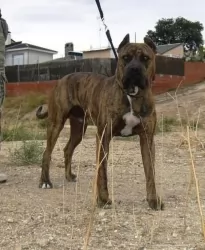 The rare Spanish Perro de Toro seems to have unclear origins, with some saying the dog is a direct descendant of the Toulouse Mastiff, while others say that the dog was developed by crossing the Alano with the Dogue de Bordeaux.
The rare Spanish Perro de Toro seems to have unclear origins, with some saying the dog is a direct descendant of the Toulouse Mastiff, while others say that the dog was developed by crossing the Alano with the Dogue de Bordeaux.
The dog hails from Spain and was once used as a fighting kind of dog but today it is essentially a family pet. The dog is an ancient breed, an ancestor of many of the molosser breeds that are around today.
 The original Bandogs were bred for guarding and protecting. It is believed that the dogs were developed from eastern shepherds, the American Pit Bull Terrier and Mastiffs and crossed with western Bullenbeissers and hounds, and it is thought that the hybrid breed came into existence way back, around 1250-1300 in Middle England.
The original Bandogs were bred for guarding and protecting. It is believed that the dogs were developed from eastern shepherds, the American Pit Bull Terrier and Mastiffs and crossed with western Bullenbeissers and hounds, and it is thought that the hybrid breed came into existence way back, around 1250-1300 in Middle England.
Although it isn’t possible to say exactly how the Bandog originated, it is certain that the dogs were bred with a functional purpose – to guard and protect. In fact in the late 1960s a veterinarian by the name of Swinford started a breeding program, even though breeders of Bandogges disagree on the breeds that went into Swinford's original breeding scheme. It is believed to have been 50% American Pit Bull Terrier and 50% molosser.
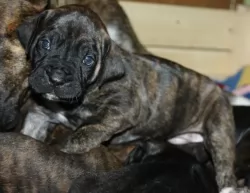 This is a strong, powerful, large breed of dog, making a good watchdog and guardian. He can be anything from 56 to 64cm in height and weigh between 34 and 40kg.
This is a strong, powerful, large breed of dog, making a good watchdog and guardian. He can be anything from 56 to 64cm in height and weigh between 34 and 40kg.
The nose of the dog is broad and black, the ears are set high and droop over slightly,making them floppy ears, but they have always been cropped to stand up erect.
He's a sturdy dog and the tail is fairly thick at the base, tapering to a point. These days it tends to be undocked and left long. The neck is strong and powerful too and the head brachycephalic. The short coat includes colors such as yellow, grey, fawn and red with the black mask.
The Spanish Bulldog looks fairly intimidating and he will certainly need training and socialization if he is to be obedient and well behaved.
He isn’t aggressive but is confident, dominant, fearless, loyal and also loving towards his owner. He is devoted towards his human family and is good with children. Like any mastiff type breed, he will need a firm, kind, consistent, patient owner. This is the kind of owner who will understand this breed type and take time out with him to exercise him and provide him with mental and physical stimulation so as to prevent boredom.
 The Bandog is a powerful, stocky, muscular dog with small, upright ears. His tail is long and tapered, but most people prefer to have the tail docked. With his broad skull, wide shoulders and powerful chest, he is also confident and intelligent. He is a rugged dog, heavily boned and muscled, and quite aggressive when provoked. This characteristic comes from the intentional breeding to combine the courage and tenacity of an American Pit Bull Terrier with the size of the Bull Mastiff and its guarding instincts.
The Bandog is a powerful, stocky, muscular dog with small, upright ears. His tail is long and tapered, but most people prefer to have the tail docked. With his broad skull, wide shoulders and powerful chest, he is also confident and intelligent. He is a rugged dog, heavily boned and muscled, and quite aggressive when provoked. This characteristic comes from the intentional breeding to combine the courage and tenacity of an American Pit Bull Terrier with the size of the Bull Mastiff and its guarding instincts.
Even though the breed has a history of competitive fighting, today when he is trained and socialized he can be a devoted, controlled and amicable family pet, even getting on well with children and being social and affectionate with his human family members. They can be aggressive with strangers, more so if provoked or threatened by them.
Bandogges are able to get along with other animals in the home if they are raised with them, but can be aggressive with pets they aren’t familiar with. You won’t find a better guard dog and with his low barking tendencies, he quietly watches, waiting to go for any intruders.
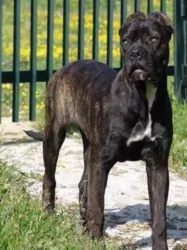 Contrary to what many people think, the temperament of the Perro de Toro is calm and well balanced. This is a reliable, loving, loyal dog who wants to protect his human family.
Contrary to what many people think, the temperament of the Perro de Toro is calm and well balanced. This is a reliable, loving, loyal dog who wants to protect his human family.
He gets on well with children and with pets in the home and when trained and socialized, this intelligent dog is well mannered, obedient and sometimes even submissive.
True, the Perro de Toro has a history of being involved in all kinds of things, from hunting to fighting and also being a working dog, but he is now waiting to show you what a splendid pet he can be if he is raised by the right kind of people.
 This is certainly an intimidating looking breed, having been developed from a variety of stock breeds, Because of this, there isn’t a standard set for the dog and his appearance can vary. He isn’t recommended for first-time dog owners, because he is quite complex – being both docile and aggressive – not your regular dog. He will certainly require an owner who shows them who is boss.
This is certainly an intimidating looking breed, having been developed from a variety of stock breeds, Because of this, there isn’t a standard set for the dog and his appearance can vary. He isn’t recommended for first-time dog owners, because he is quite complex – being both docile and aggressive – not your regular dog. He will certainly require an owner who shows them who is boss.
The Bandog may well have a reputation of being a fighter, but once he has had training and socialization, he turns out to be just a gentle giant. With a strong, firm owner, he is good with children too and becomes a devoted guardian to the entire family.
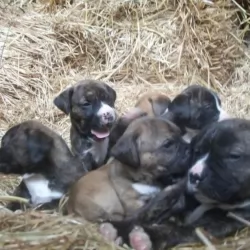 This is a dog breed that is fit and healthy, but to keep him that way you want to make sure he has enough exercise, love and nutritious food.
This is a dog breed that is fit and healthy, but to keep him that way you want to make sure he has enough exercise, love and nutritious food.
He is not known to suffer from any particular disease, but even so, it is wise to be aware of some of the common dog illnesses that your dog could pick up so you can get veterinary help for him just as soon as possible.
With cancer, cells grow rapidly and invade tissue. Dogs can get any of the many cancers there are. Both hereditary and environmental factors can contribute to the development of cancer in canines. Cancer can show up as lumps, swelling, sores that won’t heal, weight loss and difficulty with breathing.
Heartworms are transmitted from one animal to the next by mosquitoes. These worms live in the heart and pulmonary arteries of an infected animal, travelling through the bloodstream and causing havoc. Heartworm is dangerous and can actually be life threatening. Symptoms include coughing, vomiting, battling to breathe and weight loss.
This is a viral disease that can strike terror in anybody who has seen an animal with rabies. It affects the brain and spinal cord of your dog. It is preventable through means of a vaccine. Once symptoms appear, it is a disease which is nearly always fatal.
 Your Bandog is generally a robust, healthy breed, but he may well be prone to health concerns. Some of these are hip and elbow dysplasia and Bloat
Your Bandog is generally a robust, healthy breed, but he may well be prone to health concerns. Some of these are hip and elbow dysplasia and Bloat
This is an abnormal formation of the hip socket that can, if left unattended, lead to lameness and painful arthritis of the joints. eye problems.
His size and his deep chest also mean he is prone to bloat. Known as gastric dilatation and volvulus, this isn’t good for your dog as the stomach becomes distended with gas, putting pressure on the diaphragm, which can cause breathing problems.
Just because your Bandog is a healthy breed, it doesn’t mean your puppy is immune from his puppy shots. Your puppy will need his first vaccinations from 6 to 8 weeks of age for parvovirus, distemper, rabies and hepatitis.
Check your country’s vaccination regulations, because in the United States, most states require that all dogs be vaccinated against rabies.
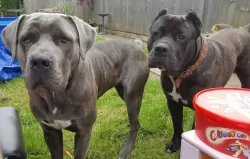 If they are not being used as working dogs, they are family pets, and you need to give them a lot of daily exercise. You will need to give him some walks or hikes and allow him a good run in the country.
If they are not being used as working dogs, they are family pets, and you need to give them a lot of daily exercise. You will need to give him some walks or hikes and allow him a good run in the country.
The Perro de Toro is a short haired dog, and as a moderate shedder, he isn’t going to require too much grooming. A brushing twice a week will help get rid of his hair.
When brushing him, turn it into a bit of a grooming session and check inside his ears, look at his eyes and try to look inside his mouth. He can’t tell you if he has terrible toothache from a rotting tooth and he will rely on you to check his teeth.
Mastiff type dogs need a wholesome diet to remain strong and active. If you are going to feed your pet one of the commercially manufactured dog foods, make sure it is one of the top quality ones.
Avoid the ones that use lots of colorants, preservatives and unhealthy fillers as these can make your dog sick. Try and give him some home-made food which can be added into his dry kibble occasionally.
Boiled chicken, brown rice or pasta and some vegetables such as carrots, sweet potato and spinach chopped up will be excellent for him and will ensure he doesn’t battle with digestive upsets. If you can, every now and then try to include some raw meat for the benefit and health of your pet. Never leave him without a bowl of fresh, cool water.
 These large, short-haired dogs have a short coat and they are easy to groom. Remove loose hair with a rubber brush twice a week. The breed is an average shedder and if you start regular brushing from when he is a young dog, he will be happy to let you do it as an adult. Check his ears and eyes regularly and clip his toe nails.
These large, short-haired dogs have a short coat and they are easy to groom. Remove loose hair with a rubber brush twice a week. The breed is an average shedder and if you start regular brushing from when he is a young dog, he will be happy to let you do it as an adult. Check his ears and eyes regularly and clip his toe nails.
The Bandog is an energetic breed that will require a good deal of exercise. This is one breed you can’t leave alone in your garden day after day. He will require games and walks to avoid boredom and frustration.
The Bandog puppy will grow and develop quickly, so his diet should be good quality dog food. He is big and thirsty and there must be a ready source of clean drinking water. Because he is inclined to drool, his water bowl will need to be cleaned out regularly to avoid him drinking contaminated water.